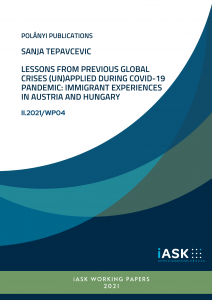Research & Studies
 About the Author
About the Author
Sanja Tepavcevic is a Research Fellow at Institute of Advanced Studies Kőszeg, and teaches in the International Studies MA Program at the University of Pannonia. Previously she held various academic and administrative positions at Central European University, Budapest, and faculty positions at Budapest Business University and Eötvös Lóránd University. Sanja is a member of the Budapest-based non-governmental organization Dialogue and external associate of the Croatia-based Institute of European and Globalization Studies. Dr. Tepavcevic holds a Russian Diploma in Journalism from Moscow State University, an MA in International Relations and European Studies, and a PhD in Political Science from the Central European University. Her research expertise includes Russian foreign policy and foreign direct investments of Russian companies, post-Soviet migrations and immigrant entrepreneurship, and migration and foreign economic policies of former Yugoslav states and countries of the Visegrad 4 Group. Her publications appear in a number of peer-reviewed journals including, United Nations’ Transnational Corporations Journal, Journal of East-West Business, and the Journal of Eastern European Management Studies. She has a decade-long experience as a journalist in Russia and Serbia. She is also a contributor for Geopolitika, a Croatian analytical portal.
Abstract
This paper traces the experiences of global crises of the immigrants from former Yugoslavia and from the former Soviet Union in Austria and Hungary. Through online surveys combined with traditional and digital ethnography, the paper reveals the ways that experiences from previous global crises influenced post-Yugoslav and post-Soviet immigrants’ perceptions, coping mechanisms, and resilience strategies during the COVID-19 pandemic.
Keywords: Global crises, (im)migrants, (post-) Yugoslav, (post-) Soviet, influence, coping, resilience, the COVID-19 pandemic, Austria, Hungary
II.2021/WP04Download